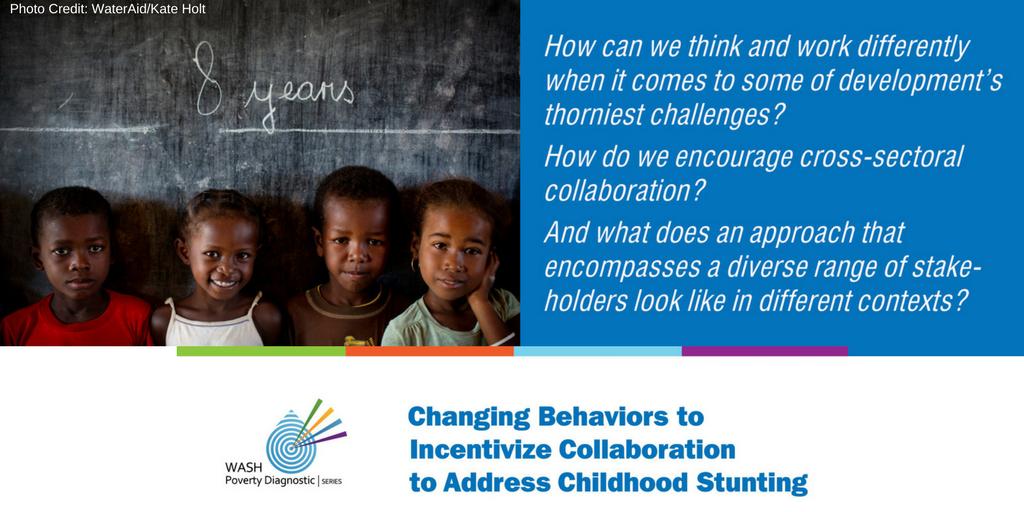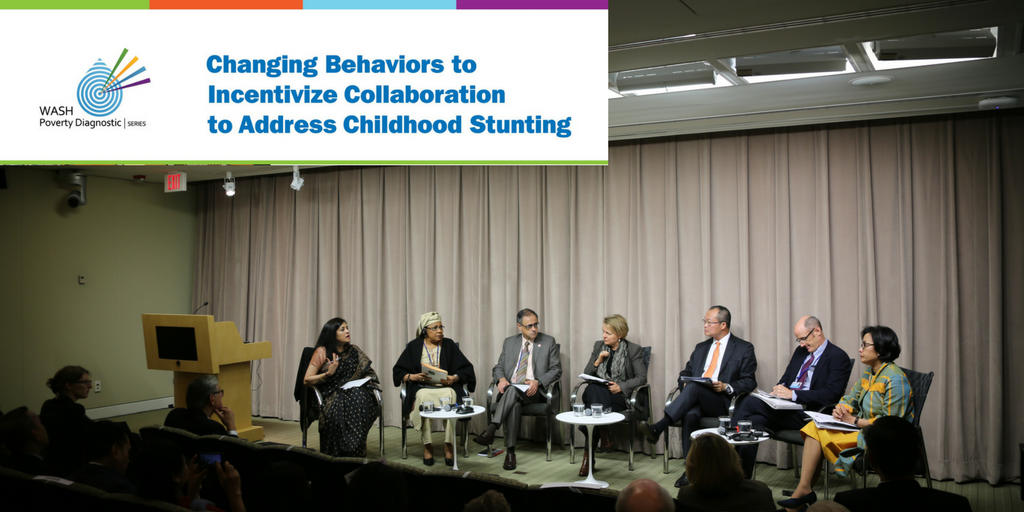Childhood stunting is one of the most significant impediments to human development and economic growth, affecting approximately 155 million children under the age of five globally, with long-term consequences later in life such as impaired cognitive development, chronic disease, and lower earnings as adults. Evidence shows that there is an urgent need for collaboration between actions in water, sanitation, health, nutrition, and other sectors to effectively combat childhood stunting.

This was discussed during the recent World Bank-IMF Annual Meetings, where leaders from the World Bank and client countries met to talk about ‘Changing Behaviors to Incentivize Collaboration to Address Childhood Stunting’. Aimed to provide guidance on how to collaborate better across sectors and institutions, this event provided an opportunity to share the latest results from the global Water Supply, Sanitation, and Hygiene (WASH) Poverty Diagnostic Initiative, led by the World Bank’s Water and Poverty Global Practices in collaboration with the Health, Nutrition, and Population and Governance Global Practices.
In her opening remarks, Laura Tuck, the World Bank’s Vice President for Sustainable Development, emphasized the need to look beyond human development programs such as health and nutrition when tackling stunting — which has been the norm — and to also look at the bigger sustainable development picture, including water and sanitation. For example, “the issue of water quality needs a lot more attention than we’ve been giving it”, Ms. Tuck pointed out, adding that it is poor water quality that leads to diarrheal disease, which prevents children from absorbing critical nutrients in food.
“When we combine the interventions, so when we look water supply and sanitation combined with access to health care and feeding practices, then the impact of this package is a lot more than the sum of its parts”, said Ms. Tuck.
Danilo Türk, Chair of the Global High-Level Panel on Water and Peace, continued the conversation by talking about the broader water agenda: "We see a great deal of competition for water among sectors, and this competitive nature should not be neglected." He stressed the importance of inter-sectorial cooperation related to water resources management that has implications for service delivery, especially in fragile states.
Senior Director of the World Bank’s Water Global Practice Guangzhe Chen presented the key findings of the WASH Poverty Diagnostic Initiative, which looked carefully at the impacts on the well-being of poor people of unequal access of water and sanitation, and the relationship between inadequate WASH with non-monetary measures of poverty, including childhood stunting. Improved coordination and targeting of WASH interventions can contribute to reducing stunting, he said. His presentation set the stage for a panel discussion which brought in valuable perspectives from the field.

As pointed out by Sri Mulyani Indrawati, Minister of Finance for Indonesia, dealing with stunting is not only about identifying the targeted populations, but also about addressing the difficulty of coordinating interventions across national and local governments. First, there is the challenge of guaranteeing political commitment across the board, followed by the challenge of converting this commitment into an effective program. To help with this, she discussed an incentive structure that has been put in place in Indonesian fiscal policies that adds stunting to its a fiscal transfer formula as a criterion to receive funds.
Tim Evans, Senior Director, Health, Nutrition, and Population Global Practice of the World Bank, talked about the benefits of working together across sectors. “We can move towards our nutrition targets by more effectively investing in WASH,” he said.
Aïchatou Boulama Kané, Minister of Planning described progress in Niger, speaking of setting up “a consultation framework in terms of bringing to bear all the different sectors that work with water, hygiene, and sanitation.” However, there are still problems. Minister Kané said that to improve, Niger would need to better coordinate among ministries to address stunting and other poverty issues through better water services. “Access to water is an emergency. It has to be noisy and people have to know about it”, Kané said.
Bella Bird, World Bank Country Director for Tanzania, Malawi, Burundi, and Somalia, shared experiences from both stable and fragile states. “(In Tanzania and Malawi,) what we see is a big focus now on the institutional mechanisms of leadership and coordination at the top level and at the community level, with accountability mechanisms built in,” she said.
“In fragile states when your state structure is a little unstable or perhaps not operating to the level that you need for delivery of such a relatively complex program, you have to look to where capacity is,” she said. “It’s usually in the third sector (the charities, the agencies, the NGOs, the UN). Sometimes in the private sector.”
Also speaking on coordination, Rachid Benmessaoud, World Bank Country Director for Nigeria, stressed the need to connect child welfare, mother’s health, and women's economic empowerment through engagement in WASH. He said that Nigeria began to see success by taking a comprehensive approach to investing in the early years of a child through a multi-sectoral program.
Mr. Chen, wrapped up the conversation by again emphasizing the importance of pushing the dialogue both within the World Bank and with our client countries on coordinating programs between water, sanitation, health, and nutrition. This requires clients to be on board, allowing for a dialogue between multiple agencies.



Join the Conversation